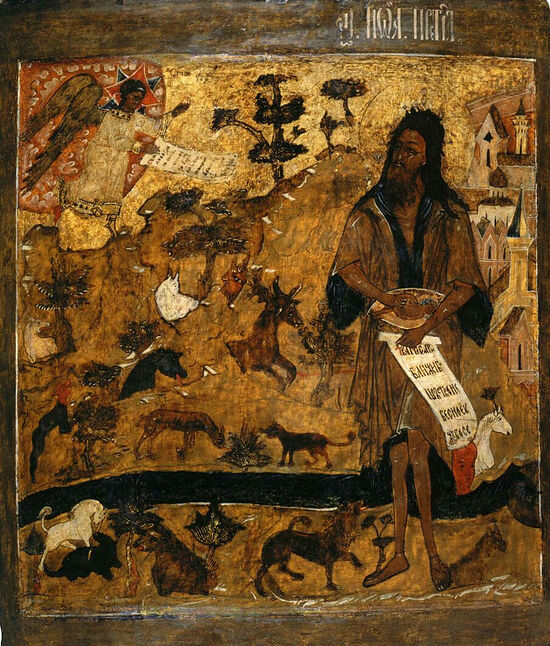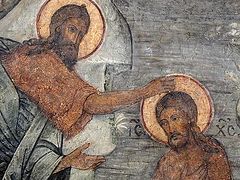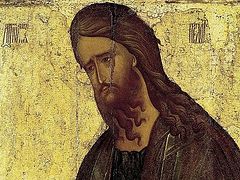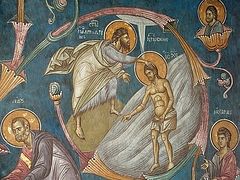 St. John the Forerunner in the desert, first third of the 17th C., Museum of Russian Icons, Moscow. Photo: icon-art.info
St. John the Forerunner in the desert, first third of the 17th C., Museum of Russian Icons, Moscow. Photo: icon-art.info
2 Timothy 4:5-8; Mark 1:1-8
Today is the Sunday before the Feast of Theophany (or Epiphany), when we will celebrate Christ’s baptism in the river Jordan and the revelation that He is truly the Son of God. His divinity is made manifest and openly displayed at His baptism when the voice of the Father declares, “You are my beloved Son” and the Holy Spirit descends upon Him in the form of a dove. Theophany shows us that Jesus Christ is not merely a great religious teacher or moral example. He is truly God—a member of the Holy Trinity– and His salvation permeates His entire creation, including the water of the river Jordan. Through His and our baptism, we become participants in the holy mystery of our salvation.
Consider how perplexing these statements about Jesus Christ as God must have been to those who knew Him before He began His public ministry. St. Luke records that the Theotokos and St. Joseph were shocked to find the12-year-old Savior discussing the Law in the Temple in Jerusalem with the elders. The gospels of Matthew and Luke record the appearance of the angelic choirs to the shepherds and the visit of the wise men, but these events do not seem to have figured prominently in our Lord’s earthly ministry.
Moreover, we must remember that no one at the time expected a Messiah who was both God and man. The word “messiah” means “anointed one,” and the Jews were looking for a leader who would deliver them from Roman oppression and lead Israel to political power and independence. Christ’s own disciples thought of Him in those terms until after His resurrection, for even those closest to the Lord had great difficulty accepting that He was not an earthly king, the kind of Messiah they had grown up expecting. How difficult it was for anyone at that time to accept that Jesus Christ is truly the Son of God, the incarnate second Person of the Holy Trinity, the divine Word Who spoke the universe into existence.
It was necessary for God to send a prophet to prepare the way by opening the hearts and minds of the people for a coming Messiah Who did not fit their preconceived notions. Few people were comfortable around St. John the Baptist and Forerunner, for he was a strict ascetic, living in the desert, eating only locusts and honey, and wearing camel skin. Like many of the Old Testament prophets before Him, St. John was outrageously bold. In addition to his stark appearance and lifestyle, his message was severe to the point of being insulting. He proclaimed God’s truth and did not care who might be offended. Instead of gently welcoming the Pharisees and Sadducees into his movement, St. John mocked them as a brood of vipers—a bunch of slimy snakes. He told the rich to share with the poor, soldiers to stop abusing their authority, and tax collectors to stop stealing from the people. He went beyond offending those powerful groups by criticizing the immorality of the royal family and lost his head as a result.
God shook up Israel with St. John the Baptist, the Forerunner of our Lord, who began to open their eyes to a Messiah Whom they did not expect. Gentle words from a respectable rabbi would not have worked, for everyone had seen and heard that before. The Jews needed a call to repentance from a wild and holy man who was absolutely fearless in calling everyone to repent by changing the direction of their lives in relation to God and neighbor. They were to make straight whatever crookedness was in them. They were to abandon hypocritical and self-serving distortions of God’s Law. No one was to say, “But I am a child of Abraham or a religious leader or a well-respected person, so repentance is not for me.” The Forerunner called everyone to greater holiness in preparation for the coming of the Messiah.
As we prepare for the Feast of Theophany, St. John’s message should certainly get our attention. We must conform our character to Jesus Christ’s because we have already received the fulfillment of the promise to Abraham. Having celebrated His birth as Orthodox Christians, we already proclaim that our Savior is the Son of God. In Him, we are “partakers of the divine nature” by grace as members of His Body, the Church. The more that we share in His life, the more clearly we will see how infinitely much more room we have for embracing the healing of our souls, for our lives have not yet become perfect epiphanies of what Christ’s salvation means for those who bear the divine image and likeness.
It would be different if the Epiphany of Jesus Christ as the Son of God were merely an idea or concept to be grasped as an abstract truth, like a mathematical equation or a philosophical statement. The spiritual life is not like that, however, because this feast calls us to participate in the gracious divine energies of the One who unites humanity and divinity in Himself. In order to enter into the holy mystery of our Lord’s epiphany, every facet of who we are as we live and breathe in this world must be transformed by His divine glory. His life must become ours. Like an iron left in the fire, we must become radiant with the glory of His salvation.
No matter how much healing we have found for our souls so far, ongoing repentance remains essential for sharing more fully in the eternal life of the God-Man. That means that we must persist in cooperating with His mercy, actively making straight what remains crooked in our lives. Like those who first heard the Forerunner, we have become too comfortable with life on our own terms, perhaps thinking that our beliefs or heritage somehow let us off the hook as God’s favorites, as those who are respectable and decent and therefore do not have to worry about repentance. “At least we are better than those groups we love to hate,” we might think of those we do not like or whom we fear for whatever reason. St. John would have no patience with such foolishness, of course. As he did to the Jews of the first century, he would tell us to wake up, abandon our excuses, and stop trying to turn God into an idol who pats us on the back and serves our agendas for worldly power, success, and comfort. He would call us, instead, to become true icons of our Lord, participating as fully as we can in the divine healing and transformation made possible for us in Jesus Christ. Those who have put on Christ in baptism and who receive the Communion of His Body and Blood must become epiphanies of His fulfillment of the human person in God’s image and likeness.
As we prepare to celebrate Theophany, let us gain the spiritual clarity to behold the glory of Christ’s baptism by straightening the crooked areas of our lives. Instead of finding ways to ignore the preaching of the Forerunner, let us take his sobering message to heart as we confess our sins and reorient ourselves to our Lord and His Kingdom. The Messiah is born and is on His way to the Jordan where His divinity will shine forth. Will we have the eyes to see His glory? Will we be ready for Him? There is only one way to prepare and that is to repent as we turn away from all that hinders our full participation in the divine glory manifest in Him. Now is the time to get ready to share personally in this great mystery of our salvation by preparing the way of the Lord and making His paths straight in our own lives.



